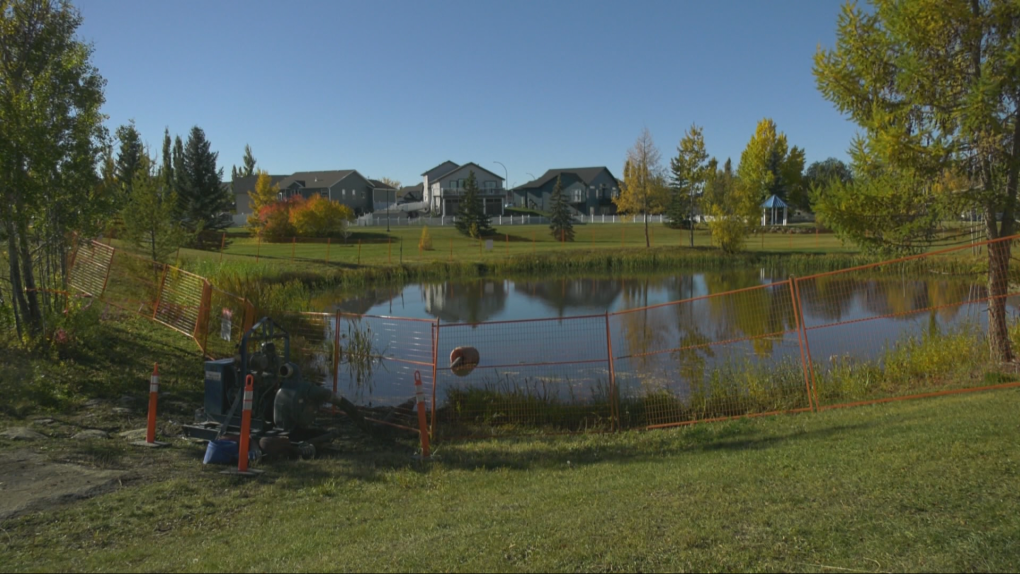An invasion of goldfish at a quiet pond in the southwestern corner of the Town of Sylvan Lake is causing an uproar.
They have been appearing consistently at a neighbourhood storm pond for the last year and a half. The town says people are dumping goldfish into it.
“It is a huge problem for the town,” Monique Johnson, the environmental services manager for the Town of Sylvan Lake, told CTV News Edmonton.
“Goldfish are not a naturally occurring species in our waterways in Alberta. They’re introduced by humans.”
The town became aware of goldfish in the Lakeway Landing storm pond in May last year, when neighbourhood residents let town councillors know of them.
“We had a very young resident write a note to one of our councillors and say, ‘When I walk by this pond, I see all these goldfish. Is this a problem?'” Mayor Megan Hanson said.
Since then, Sylvan Lake has spent more $118,000 trying to fix the problem before it spreads. There’s concern goldfish could eventually enter the town’s namesake lake as the storm pond drains into it.
Johnson said the town hasn’t yet detected goldfish in its other storm ponds.
Sylvan Lake is a popular Alberta recreational and tourist destination 20 kilometres west of Red Deer and 143 kilometres southwest of Edmonton.
Mark Boyce, an ecology professor at the University of Alberta, told CTV News Edmonton goldfish pose a threat to the ecosystem.
“These goldfish in particular, because they stir up the water, they change the limnology. they change the characteristics of the water body,” he said.
And the town is going to great lengths to stop the problem, including asking for permission to use a form of pesticide that isn’t approved for use in this case.
Work to rid the pond of goldfish started soon after their discovery in Lakeway Landing.
Crews manually removed 14,000 goldfish from it that May – they didn’t have access to chemical treatments at the time – drained the pond in November to extract more of them and used the ‘electrofishing’ method this spring. Thirty of the fish found are suspected to be Prussian Carp, a highly invasive species that isn’t native to the Western Hemisphere.
With the help of an environmental consultant, workers last month applied rotenone, a liquid pesticide, to the pond, calling it “the safest, cheapest and most effective way to remove invasive goldfish with the least harm to the environment.”
 The Lakeway Landing storm pond in Sylvan Lake, Alta. (Adel Ahmed/CTV News Edmonton)September was an optimal time for the chemical application due to weather and the goldfish life cycle, the town said.
The Lakeway Landing storm pond in Sylvan Lake, Alta. (Adel Ahmed/CTV News Edmonton)September was an optimal time for the chemical application due to weather and the goldfish life cycle, the town said.
Boyce said rotenone is a “very toxic substance” that kills “anything with gills,” including fish, salamanders and types of aquatic insects, and is mildly toxic to humans and other mammals as well.
“It doesn’t normally kill people because it makes you vomit, so you’re not likely to ingest enough that it will be fatal, but it’s not very nice stuff,” he said.
The rotenone treatment was highly effective, the town said in an Oct. 4 update, saying 441 more goldfish had been removed.
The town’s total goldfish kill is 14,773 so far.
Workers planned additional rotenone treatment on Tuesday to target newly hatched goldfish eggs.
On Thursday, the town said the pond was free of goldfish, but it wants to treat the pond with rotenone once again, this time with a powdered form of it because there’s a shortage of the liquid version.
Powdered rotenone is not government-approved for use.
The town says it’s their only option right now and has contacted Alberta Municipalities, an advocate for the province’s communities, in hopes they can work with the provincial and federal governments and get approval for use of the powdered form.
“Goldfish are hardy. They are prolific breeders, prolific eaters, and they do upset ecosystems by decimating other fish population,” Johnson said, adding the goldfish “survive through everything.”
“It’s crucial that the town makes any effort that it can so that these goldfish do not make their way to the lake.”
Boyce said the rotenone use in Sylvan Lake’s case with the Lakeway Landing storm pond “seems like it may be worth the sacrifice.”
“But you’re wiping out most of the aquatic life that might be in that stormwater pond,” he said.
With files from CTV News Edmonton’s Nicole Weisberg